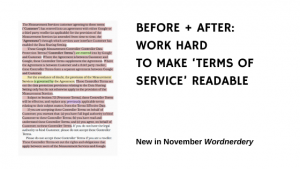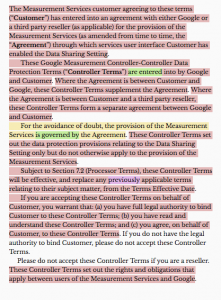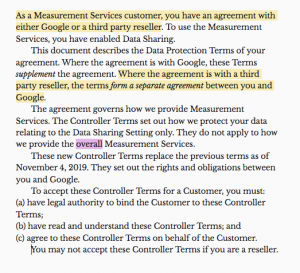 Oh, my poor eyes and brain.
Oh, my poor eyes and brain.
When I logged into my analytics last week, Google asked me to agree to new “Google Measurement Controller-Controller Data Protection Terms.” Like you, probably, I usually just click on “agree.” This time, I copied, saved and read the terms.
Google doesn’t claim it changed its terms of service to be more clear. Good thing, because that would be a lie.
I ran the lengthy preamble to the 2,300-word terms through the Hemingway app, which measures how easily a piece of writing will be understood. I trimmed, tucked and simplified, and then ran the readability stats on both versions. Watch out, here’s the before, with an alarming amount of pinky-red that means “very hard to read”:

Whenever you’re explaining something complicated like this, you can bet the lawyers have their hands all over it. Suggest to them that you want to focus on helping your reader understand, and will provide a link to the full and binding legal definition in all its glory somewhere else. Thus you can take out legal wording like “as amended from time to time” and assume people know that “The Measurement Services customer” and “Customer” are one and the same.
To start the rewrite, I addressed the reader, who is presumably said Customer. I shortened the sentences and got to the point. I used italics to highlight some differences and moved the “a, b, c” points to bullets. Here’s my rewrite:

Better, although there is always room for improvement (“Bind the customer,” for instance). Here are some readability results using the Hemingway app and StoryToolz:
| READABILITY MEASURE | BEFORE | AFTER |
| Flesch reading ease (30-50 = difficult; 60-70 = plain English) | 43.3/100 | 60.7/100 |
| Hemingway app readability ranking (recommend no more than Gr. 9) | Grade 16 | Grade 8 |
| # of very hard-to-read sentences | 8 | 0 |
| # words | 270 | 175 |
| Average words per sentence (15-18 words = 80-89% understanding; 22-25 = 60-69%) | 22.5 | 15.7 |
| Longest sentence (43+ words = 0-9% understanding) | 57 (!!) words | 21 words |
Have you seen a “before” piece of writing that needs an “after”? Please share; I’m always looking for good (bad) examples.
This post first appeared in an issue of my newsletter. Wordnerdery is a quick read about words, effective/expressive writing, employee/internal communication, newsletters and more. Are you a subscriber yet? If yes, thanks for reading! If not, you can sign up right now. In keeping with Canadian and U.S. anti-spam laws and just plain good manners, you can easily unsubscribe any time.
